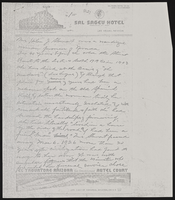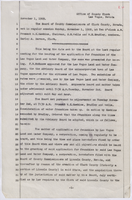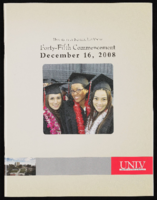Search the Special Collections and Archives Portal
Search Results

Stewart family histories
Date
Archival Collection
Description
Stewart family histories
Text
Howard Cannon Papers
Identifier
Abstract
The Howard Cannon Papers (1958-1988) contain the personal, administrative, and legislative papers of Howard W. Cannon, U.S. Senator from Nevada between 1959 to 1983. The collection primarily pertains to Cannon's time in office from the 86th Congress in 1959 to the 97th Congress in 1983. Materials include correspondence, speech transcripts and supporting research material, press releases, reports, memoranda, newspaper and magazine clippings, and Senate voting records. The collection also includes constituent correspondence and casework related to legislative issues such as foreign relations, social security, veterans, tax reform, labor, aviation, nuclear testing and waste, civil rights, and environmental protection.
For a detailed inventory, please contact Special Collections and Archives (special.collections@unlv.edu).
Archival Collection

Della Coates interview, March 18, 1978: transcript
Date
Archival Collection
Description
On March 18, 1978, collector Bill Hitchcock interviewed Della Coates (b. June 17th, 1919 in Birmingham, Alabama) at her home in Las Vegas, Nevada. In the interview, Della Coates discusses her time working for the telephone company. She also speaks about the changes in education and about changes throughout Las Vegas.
Text

Minutes of Clark County commission meeting, November 1, 1909
Date
Archival Collection
Description
Minutes of meeting discussing the granting of a franchise to the Las Vegas Land and Water Company.
Text

Laura Sussman oral history interview: transcript
Date
Archival Collection
Description
Oral history interview with Laura Sussman conducted by Barbara Tabach and Claytee D. White on March 15, 2018 for the Remembering 1 October Oral History Project. In this interview, Laura Sussman, co-owner of Kraft-Sussman Funeral & Cremation Services, discusses the funeral home's role during the aftermath of the October 1, 2017 Las Vegas, Nevada mass shooting. She talks about the collaborated efforts of the funeral home and the coroner's office to care for the deceased, giving some details on the role of a coroner and the specific cases the funeral home was in charge of. Along with the victims, she discusses the potential cremation they were asked to do of the shooter. Throughout the interview, Sussman emphasizes the funeral home's goal of providing support to the families of the deceased.
Text

University of Nevada, Las Vegas (UNLV) 45th commencement program
Date
Archival Collection
Description
Commencement program from University of Nevada, Las Vegas Commencement Programs and Graduation Lists (UA-00115).
Text

Erma Linda Rivera oral history interview: transcript
Date
Archival Collection
Description
Oral history interview with Erma Linda Rivera conducted by Laurents Bañuelos-Benitez, Nathalie Martinez, Maribel Estrada Calderón, and Barbara Tabach on January 09, 2019 for the Latinx Voices of Southern Nevada Oral History Project. In this interview, Erma Linda Rivera discusses her early life as a grandchild of immigrants. She shares her experiences growing up in a mining town in Arizona. After marrying, both Erma Linda and her husband Jose became federal civil servants. This would lead Erma Linda Rivera to Las Vegas, Nevada in 1984. Prior to retirement, Rivera worked as an regional Equal Employment Opportunity manager. Rivera discusses her career working for the Department of the Interior, sharing how her job helped fuel her passion for social justice. Erma Linda relates the importance of civic involvement in her life. Finally, she reflects on how Henderson, Nevada has changed over the years she has lived there.
Text

Deryk and Melissa Engelland oral history interview: transcript
Date
Archival Collection
Description
Oral history interview with Deryk and Melissa Engelland conducted by Barbara Tabach on May 23, 2019 for the Remembering 1 October Oral History Project.
Deryk Engelland is a professional hockey player and team spokesperson for the Vegas Golden Knights in Las Vegas. He and his wife, Melissa, discuss the events of the October 1 shooting and how the Golden Knights chose to honor the community that they were representing after this tragic event. Deryk and Melissa Engelland established the Vegas Born Foundation to honor first responders and community heroes, and the couple talks about the organization's accomplishments since its inception.
Subjects discussed include: Las Vegas healing.
Text

Transcript of interview with George Gilbert by Ruth Guidi, February 10, 1975
Date
Archival Collection
Description
On February 10, 1975, Ruth Guidi interviewed George Gilbert (born 1931 in Southgate, California) about his life in Nevada. George first talks about his education in Las Vegas and his family background. He also talks about times during World War II, the shopping facilities available to those in Las Vegas, the casinos that existed, the churches that were built, and the Helldorado parades. The two also discuss social clubs, politics, the atomic testing, environmental and social changes, the Mormon Fort, Hoover Dam, and the first movie theaters.
Text
